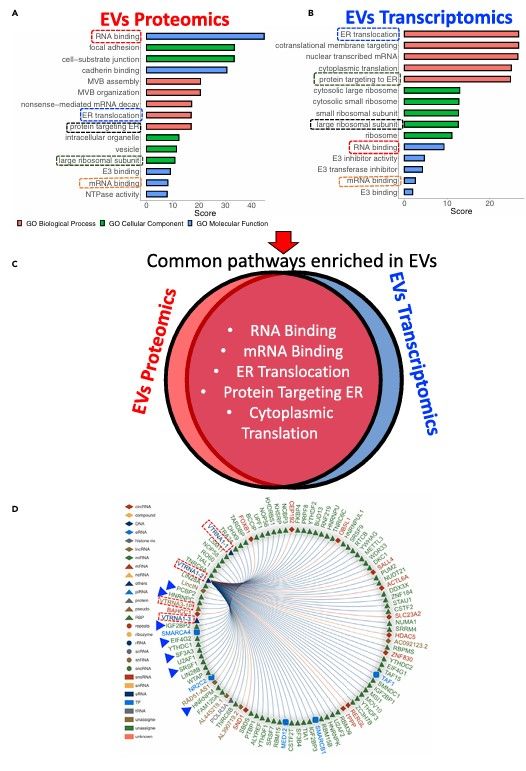Extracellular Vesicle Whole Transcriptome Sequencing Service
Overview Services Features FAQs
The whole transcriptome in EVs provides insight into the molecular composition of EVs and can be used to study gene expression, cell-to-cell communication, and disease progression. Creative Biolabs provides WTS sequencing service for EVs, assisting clients in recognizing gene expression patterns, studying the gene regulation involved in EVs, and identifying novel EVs-based transcripts.
Overview
Whole transcriptome sequencing (also known as whole transcriptome analysis or WTS) for EVs (extracellular vesicles) is a type of gene expression analysis that is used to measure the activity of all genes in EVs from a given sample source. The whole transcriptome in EVs refers to the full set of RNA molecules, including mRNAs, microRNAs, and other non-coding RNAs, that are packaged within EVs. WTS allows for the analysis of the RNA content of the whole transcriptome of EVs, it can be used to identify the presence of different types of EVs such as exosomes, microvesicles, and apoptotic bodies, allowing the determination of which genes are expressed in EVs and the measurement of the relative abundance of transcripts associated with different EVs. This can give significant information about the function of EVs in specific cell types or tissues, as well as the pathways regulated by EVs. WTS can also be used to identify novel EV-associated transcripts, which could be used as biomarkers for disease diagnosis or prognosis. In addition, WTS can be used to study the functional roles of EVs in various biological processes, such as intercellular communication, immune response, and cell differentiation. Altogether, WTS for EVs involves a wide range of applications, including cancer research, immunology, and drug discovery.
 Fig. 1 RNA-proteins and RNA-RNA complexes are enriched in EVs according to integrated proteo-transcriptomic studies.1
Fig. 1 RNA-proteins and RNA-RNA complexes are enriched in EVs according to integrated proteo-transcriptomic studies.1
WTS for EVs Procedures at Creative Biolabs
-
Isolation of EVs: EVs can be isolated from various biological fluids, such as blood, urine, saliva, and cell culture supernatants, using methods such as ultracentrifugation, size exclusion chromatography, and immunoaffinity methods.
-
RNA extraction and purification: RNA can be extracted from the isolated EVs using methods such as TRIzol or column-based methods.
-
Library preparation and sequencing: After the RNA has been extracted, it needs to be converted into a sequencing library. This involves fragmentation, reverse transcription, and adapter ligation, followed by PCR amplification. The library can then be sequenced using a high-throughput sequencing platform.
-
Data analysis: The sequencing data needs to be analyzed to identify the transcripts present in EVs, which can be done with bioinformatics tools.
Features
-
Comprehensive Analysis: Our Whole Transcriptome Sequencing Service for EVs provides a comprehensive analysis of the entire transcriptome within EVs, enabling a deeper understanding of cellular processes and intercellular communication.
-
High-Resolution Data: This service offers high-resolution sequencing data, capturing even the slightest changes in the transcriptome of EVs, crucial for identifying key biomarkers and understanding disease pathogenesis.
-
Customizable and Scalable: Our service is highly customizable to meet your specific research needs and can be scaled up or down based on the sample size and the depth of analysis required.
-
Expert Support: Our team of experts provides continuous support throughout the project, from sample preparation to data interpretation, ensuring a smooth and successful sequencing experience.
WTS for EVs can capture information about the types of gene expression and proteins present in EVs, and how these molecules are involved in regulatory pathways. Creative Biolabs has specialized EV molecular technologists to provide WTS services for EVs, supporting the profiling of the molecular mechanisms of how EVs are involved in different biological processes. Please contact us for a customized quote.
FAQs
Q: Why should I choose this service?
A: Our Whole Transcriptome Sequencing Service for EVs offers unparalleled insights into the transcriptome of these vesicles. This can assist you in finding new biomarkers, comprehending the causes of diseases, and creating fresh approaches to treatment.
Q: What is the duration of the sequencing process?
A: The duration of the sequencing process depends on various factors such as the number of samples, the depth of sequencing required, and the efficiency of the sequencing platform. Typically, the entire process, from sample preparation to data analysis, can take 8-12 weeks to complete.
Q: How much does this service cost?
A: The cost of our Whole Transcriptome Sequencing Service for EVs depends on the number of samples, the depth of sequencing, and additional services required. Please contact us for a detailed quote.
Q: What uses is this service intended for?
A: This service has a wide range of applications including biomarker discovery, disease diagnosis and prognosis, drug target identification, and understanding the role of EVs in intercellular communication.
Reference
-
Chen, Tzu-Yi, et al. "Extracellular vesicles carry distinct proteo-transcriptomic signatures that are different from their cancer cell of origin." Iscience 25.6 (2022). Under Open Access license CC BY 4.0. The image was modified by revising the title.
For Research Use Only. Cannot be used by patients.
Related Services:

 Fig. 1 RNA-proteins and RNA-RNA complexes are enriched in EVs according to integrated proteo-transcriptomic studies.1
Fig. 1 RNA-proteins and RNA-RNA complexes are enriched in EVs according to integrated proteo-transcriptomic studies.1








